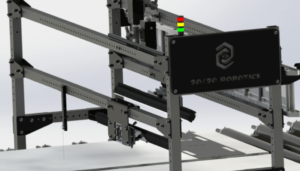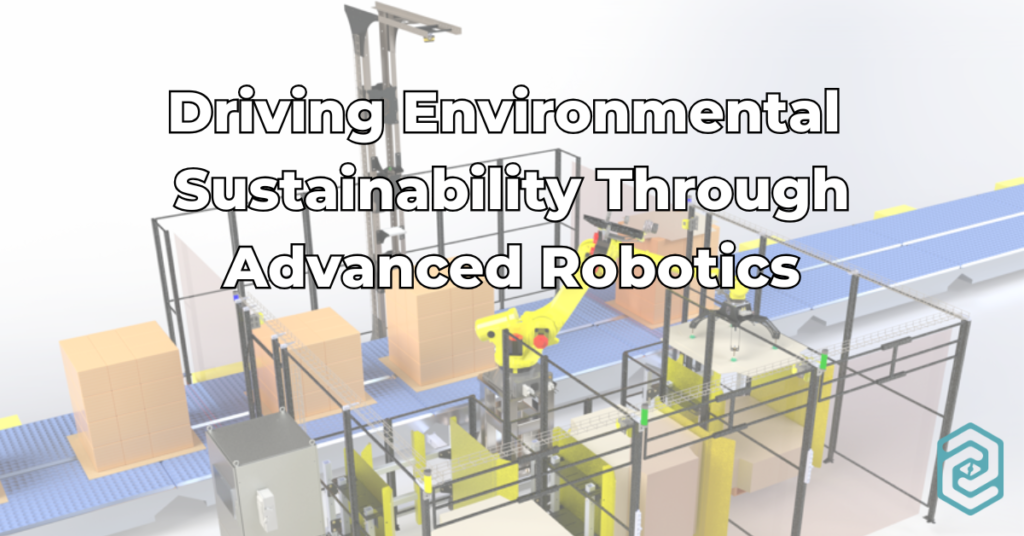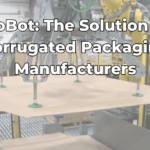In today’s industrial landscape, environmental sustainability is a crucial business imperative. As a manufacturing leader, you’re likely seeking ways to reduce your ecological footprint while maintaining productivity. Advanced robotics and automation emerge as powerful allies in this green revolution, offering not just efficiency gains but significant sustainability benefits that directly impact your bottom line.
The Intersection of Robotics and Sustainability
Cutting-edge robotics and machine vision systems, like those developed by 20/20 Robotics, are transforming manufacturing processes across industries. These technologies don’t just boost your efficiency; they play a pivotal role in driving environmental sustainability while improving your operational metrics.
Precision and Waste Reduction
Advanced robotics systems excel at precision, a key factor in reducing waste and improving your resource utilization. By leveraging high-end machine vision technology and sophisticated programming, these robots perform tasks with unparalleled accuracy. This precision translates directly into reduced waste in your operations:
You’ll see fewer defective products, meaning less material waste
Your use of raw materials will be optimized
Your energy consumption will decrease through more efficient operations
Take the Guardian system from 20/20 Robotics, for instance. It uses machine vision to ensure your products stay within pallet boundaries, preventing costly errors and material losses that can eat into your profit margins.
Energy Efficiency
Modern robotic systems are designed with energy efficiency in mind, helping you cut down on one of your biggest operational costs. These systems:
Operate continuously without breaks, maximizing your productivity per unit of energy consumed
Employ smart power management systems to slash energy use during idle periods
Execute tasks faster and more efficiently than traditional methods, significantly reducing your overall energy consumption
By implementing these capabilities, you can expect to see a marked reduction in your energy footprint – often by 20-30% – while maintaining or even increasing your output.
The Role of Machine Vision in Sustainable Manufacturing
Machine vision systems, a cornerstone of 20/20 Robotics’ offerings, contribute significantly to sustainable manufacturing practices. By providing real-time, high-accuracy inspection and control, these systems drive efficiency and reduce waste throughout your production process.
Quality Control and Defect Detection
The OASIS (Optical AI Surface Inspection System) from 20/20 Robotics exemplifies how advanced machine vision can drive sustainability in your operations. By detecting defects early in the production process, it helps you:
Minimize waste from defective products, often reducing scrap rates by up to 50%
Cut down on energy and resources spent on rework
Ensure consistent quality, extending product lifecycles and enhancing customer satisfaction
This AI-powered system can be trained to distinguish between good and bad products, much like your best human inspector, but with greater consistency and speed – often processing hundreds of items per minute with 99.9% accuracy.

Optimized Resource Utilization
Machine vision systems monitor and optimize resource use in real time, ensuring:
Precise application of materials, reducing your waste by up to 30%
Efficient use of packaging materials, cutting your packaging costs
Optimal loading of pallets and shipping containers, reducing your transportation emissions and costs
By fine-tuning these processes, you can significantly reduce your material use and associated costs, often seeing ROI within 12-18 months.
Industry-Specific Sustainability Benefits
20/20 Robotics’ solutions cater to various industries, each benefiting from enhanced sustainability through tailored applications of robotics and machine vision. Let’s explore how these technologies can benefit your specific sector:
Food and Beverage Industry
If you’re in the food and beverage industry, hygienic automation solutions for food processing and packaging not only ensure safety but also:
Reduce your food waste through precise handling and packaging, often by 20-25%
Optimize your energy use in processing and storage, potentially cutting energy costs by 15%
Enhance traceability, supporting your sustainable sourcing initiatives and helping you meet stringent FDA regulations
These improvements contribute to a more sustainable food supply chain, from production to consumption, while also boosting your operational efficiency and brand reputation.
Electronics Manufacturing
For those in electronics manufacturing, advanced robotics and machine vision systems contribute to sustainability by:
Enhancing accuracy in assembly, reducing your electronic waste by up to 40%
Optimizing component use, conserving rare earth materials and potentially reducing material costs by 10-15%
Improving energy efficiency in production processes, often leading to a 25% reduction in energy consumption
In an industry where precision is paramount, these technologies help you meet sustainability goals without compromising quality, all while staying compliant with evolving environmental regulations like RoHS and WEEE.
Building and Construction
If you’re in the building and construction industry, automated solutions support your sustainability efforts through:
Precise material cutting and assembly, minimizing construction waste by up to 30%
Improved quality control, ensuring longer-lasting structures and reducing warranty claims
Optimized use of sustainable materials in construction processes, helping you meet green building standards
By reducing waste and improving efficiency, robotics help make your construction projects greener and more sustainable, potentially earning you LEED certification points and improving your competitive edge in the market.
The Future of Sustainable Manufacturing
As we look to the future, the role of robotics and machine vision in driving sustainability will only grow. Emerging technologies like AI and the Internet of Things (IoT) will further enhance the capabilities of these systems, opening new avenues for environmental stewardship in your manufacturing processes.
Imagine AI-powered robots that can adapt in real-time to changes in your production environment, further reducing waste and energy consumption. Or consider IoT sensors that can predict maintenance needs before breakdowns occur, minimizing downtime and resource waste. These aren’t far-off concepts – they’re technologies that are beginning to reshape manufacturing today.
By partnering with innovators like 20/20 Robotics, you can position your operations at the forefront of this green industrial revolution, driving both sustainability and profitability. You’ll not only reduce your environmental impact but also gain a significant competitive advantage in an increasingly eco-conscious market.
Ready to explore how advanced robotics can boost your sustainability efforts? Contact 20/20 Robotics today to discuss tailored solutions for your manufacturing needs. Our team of experts can provide a free assessment of your current processes and show you how our robotics solutions can drive sustainability and efficiency in your specific operations.
FAQs
How do robotics systems contribute to energy efficiency in manufacturing?
Robotic systems operate continuously without breaks, use smart power management during idle periods, and perform tasks faster than traditional methods. This can reduce your overall energy consumption by 20-30%.
Can machine vision systems really help reduce waste in production?
Yes. Systems like 20/20 Robotics’ OASIS can cut waste by up to 50% by detecting defects early, minimizing scrap, and reducing rework.
Are robotic solutions suitable for all industries looking to improve sustainability?
Most industries can benefit from robotics. 20/20 Robotics offers customized solutions for various sectors, tailoring systems to your unique processes and sustainability goals.






